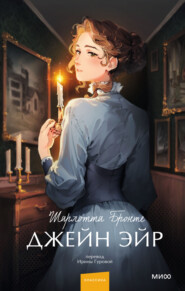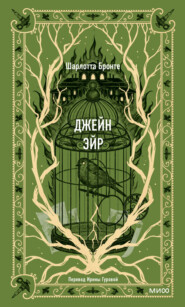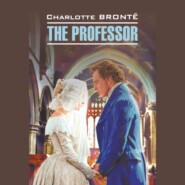По всем вопросам обращайтесь на: info@litportal.ru
(©) 2003-2024.
✖
Shirley
Настройки чтения
Размер шрифта
Высота строк
Поля
“She told me quite cheerfully, not as an ominous circumstance, which I felt it to be. She said I was the only person besides her solicitor, Pearson Hall, and Mr. Helstone and Mr. Yorke, who knew anything about it; and to me, she intimated, she wished specially to explain its provisions.”
“Go on, Harry.”
“‘Because,’ she said, looking down on me with her beautiful eyes – oh! they are beautiful, Mr. Moore! I love them! I love her! She is my star! Heaven must not claim her! She is lovely in this world, and fitted for this world. Shirley is not an angel; she is a woman, and she shall live with men. Seraphs shall not have her! Mr. Moore, if one of the ‘sons of God,’ with wings wide and bright as the sky, blue and sounding as the sea, having seen that she was fair, descended to claim her, his claim should be withstood – withstood by me – boy and cripple as I am.”
“Henry Sympson, go on, when I tell you.”
“‘Because,’ she said, ‘if I made no will, and died before you, Harry, all my property would go to you; and I do not intend that it should be so, though your father would like it. But you,’ she said, ‘will have his whole estate, which is large – larger than Fieldhead. Your sisters will have nothing; so I have left them some money, though I do not love them, both together, half so much as I love one lock of your fair hair.’ She said these words, and she called me her ‘darling,’ and let me kiss her. She went on to tell me that she had left Caroline Helstone some money too; that this manor house, with its furniture and books, she had bequeathed to me, as she did not choose to take the old family place from her own blood; and that all the rest of her property, amounting to about twelve thousand pounds, exclusive of the legacies to my sisters and Miss Helstone, she had willed, not to me, seeing I was already rich, but to a good man, who would make the best use of it that any human being could do – a man, she said, that was both gentle and brave, strong and merciful – a man that might not profess to be pious, but she knew he had the secret of religion pure and undefiled before God. The spirit of love and peace was with him. He visited the fatherless and widows in their affliction, and kept himself unspotted from the world. Then she asked, ‘Do you approve what I have done, Harry?’ I could not answer. My tears choked me, as they do now.”
Mr. Moore allowed his pupil a moment to contend with and master his emotion. He then demanded, “What else did she say?”
“When I had signified my full consent to the conditions of her will, she told me I was a generous boy, and she was proud of me. ‘And now,’ she added, ‘in case anything should happen, you will know what to say to Malice when she comes whispering hard things in your ear, insinuating that Shirley has wronged you, that she did not love you. You will know that I did love you, Harry; that no sister could have loved you better – my own treasure.’ Mr. Moore, sir, when I remember her voice, and recall her look, my heart beats as if it would break its strings. She may go to heaven before me – if God commands it, she must; but the rest of my life – and my life will not be long, I am glad of that now – shall be a straight, quick, thoughtful journey in the path her step has pressed. I thought to enter the vault of the Keeldars before her. Should it be otherwise, lay my coffin by Shirley’s side.”
Moore answered him with a weighty calm, that offered a strange contrast to the boy’s perturbed enthusiasm.
“You are wrong, both of you – you harm each other. If youth once falls under the influence of a shadowy terror, it imagines there will never be full sunlight again; its first calamity it fancies will last a lifetime. What more did she say? Anything more?”
“We settled one or two family points between ourselves.”
“I should rather like to know what.”
“But, Mr. Moore, you smile. I could not smile to see Shirley in such a mood.”
“My boy, I am neither nervous, nor poetic, nor inexperienced. I see things as they are; you don’t as yet. Tell me these family points.”
“Only, sir, she asked me whether I considered myself most of a Keeldar or a Sympson; and I answered I was Keeldar to the core of the heart and to the marrow of the bones. She said she was glad of it; for, besides her, I was the only Keeldar left in England. And then we agreed on some matters.”
“Well?”
“Well, sir, that if I lived to inherit my father’s estate, and her house, I was to take the name of Keeldar, and to make Fieldhead my residence. Henry Shirley Keeldar I said I would be called; and I will. Her name and her manor house are ages old, and Sympson and Sympson Grove are of yesterday.”
“Come, you are neither of you going to heaven yet. I have the best hopes of you both, with your proud distinctions – a pair of half-fledged eaglets. Now, what is your inference from all you have told me? Put it into words.”
“That Shirley thinks she is going to die.”
“She referred to her health?”
“Not once; but I assure you she is wasting. Her hands are grown quite thin, and so is her cheek.”
“Does she ever complain to your mother or sisters?”
“Never. She laughs at them when they question her. Mr. Moore, she is a strange being, so fair and girlish – not a man-like woman at all, not an Amazon, and yet lifting her head above both help and sympathy.”
“Do you know where she is now, Henry? Is she in the house, or riding out?”
“Surely not out, sir. It rains fast.”
“True; which, however, is no guarantee that she is not at this moment cantering over Rushedge. Of late she has never permitted weather to be a hindrance to her rides.”
“You remember, Mr. Moore, how wet and stormy it was last Wednesday – so wild, indeed, that she would not permit Zoë to be saddled? Yet the blast she thought too tempestuous for her mare she herself faced on foot; that afternoon she walked nearly as far as Nunnely. I asked her, when she came in, if she was not afraid of taking cold. ‘Not I,’ she said. ‘It would be too much good luck for me. I don’t know, Harry, but the best thing that could happen to me would be to take a good cold and fever, and so pass off like other Christians.’ She is reckless, you see, sir.”
“Reckless indeed! Go and find out where she is, and if you can get an opportunity of speaking to her without attracting attention, request her to come here a minute.”
“Yes, sir.”
He snatched his crutch, and started up to go.
“Harry!”
He returned.
“Do not deliver the message formally. Word it as, in former days, you would have worded an ordinary summons to the schoolroom.”
“I see, sir. She will be more likely to obey.”
“And, Harry,”
“Sir?”
“I will call you when I want you. Till then, you are dispensed from lessons.”
He departed. Mr. Moore, left alone, rose from his desk.
“I can be very cool and very supercilious with Henry,” he said. “I can seem to make light of his apprehensions, and look down du haut de ma grandeur on his youthful ardour. To him I can speak as if, in my eyes, they were both children. Let me see if I can keep up the same rôle with her. I have known the moment when I seemed about to forget it, when Confusion and Submission seemed about to crush me with their soft tyranny, when my tongue faltered, and I have almost let the mantle drop, and stood in her presence, not master – no – but something else. I trust I shall never so play the fool. It is well for a Sir Philip Nunnely to redden when he meets her eye. He may permit himself the indulgence of submission. He may even, without disgrace, suffer his hand to tremble when it touches hers; but if one of her farmers were to show himself susceptible and sentimental, he would merely prove his need of a strait waistcoat. So far I have always done very well. She has sat near me, and I have not shaken – more than my desk. I have encountered her looks and smiles like – why, like a tutor, as I am. Her hand I never yet touched – never underwent that test. Her farmer or her footman I am not – no serf nor servant of hers have I ever been; but I am poor, and it behooves me to look to my self-respect – not to compromise an inch of it. What did she mean by that allusion to the cold people who petrify flesh to marble? It pleased me – I hardly know why; I would not permit myself to inquire. I never do indulge in scrutiny either of her language or countenance; for if I did, I should sometimes forget common sense and believe in romance. A strange, secret ecstasy steals through my veins at moments. I’ll not encourage – I’ll not remember it. I am resolved, as long as may be, to retain the right to say with Paul, ‘I am not mad, but speak forth the words of truth and soberness.’”
He paused, listening.
“Will she come, or will she not come?” he inquired. “How will she take the message? Naïvely or disdainfully? Like a child or like a queen? Both characters are in her nature.
“If she comes, what shall I say to her? How account, firstly, for the freedom of the request? Shall I apologize to her? I could in all humility; but would an apology tend to place us in the positions we ought relatively to occupy in this matter? I must keep up the professor, otherwise – I hear a door.”
He waited. Many minutes passed.
“She will refuse me. Henry is entreating her to come; she declines. My petition is presumption in her eyes. Let her only come, I can teach her to the contrary. I would rather she were a little perverse; it will steel me. I prefer her cuirassed in pride, armed with a taunt. Her scorn startles me from my dreams; I stand up myself. A sarcasm from her eyes or lips puts strength into every nerve and sinew I have. Some step approaches, and not Henry’s.”
The door unclosed; Miss Keeldar came in. The message, it appeared, had found her at her needle; she brought her work in her hand. That day she had not been riding out; she had evidently passed it quietly. She wore her neat indoor dress and silk apron. This was no Thalestris from the fields, but a quiet domestic character from the fireside. Mr. Moore had her at advantage. He should have addressed her at once in solemn accents, and with rigid mien. Perhaps he would, had she looked saucy; but her air never showed less of crânerie. A soft kind of youthful shyness depressed her eyelid and mantled on her cheek. The tutor stood silent.
She made a full stop between the door and his desk.
“Did you want me, sir?” she asked.
“I ventured, Miss Keeldar, to send for you – that is, to ask an interview of a few minutes.”
She waited; she plied her needle.
“Well, sir” (not lifting her eyes), “what about?”
“Be seated first. The subject I would broach is one of some moment. Perhaps I have hardly a right to approach it. It is possible I ought to frame an apology; it is possible no apology can excuse me. The liberty I have taken arises from a conversation with Henry. The boy is unhappy about your health; all your friends are unhappy on that subject. It is of your health I would speak.”
“Go on, Harry.”
“‘Because,’ she said, looking down on me with her beautiful eyes – oh! they are beautiful, Mr. Moore! I love them! I love her! She is my star! Heaven must not claim her! She is lovely in this world, and fitted for this world. Shirley is not an angel; she is a woman, and she shall live with men. Seraphs shall not have her! Mr. Moore, if one of the ‘sons of God,’ with wings wide and bright as the sky, blue and sounding as the sea, having seen that she was fair, descended to claim her, his claim should be withstood – withstood by me – boy and cripple as I am.”
“Henry Sympson, go on, when I tell you.”
“‘Because,’ she said, ‘if I made no will, and died before you, Harry, all my property would go to you; and I do not intend that it should be so, though your father would like it. But you,’ she said, ‘will have his whole estate, which is large – larger than Fieldhead. Your sisters will have nothing; so I have left them some money, though I do not love them, both together, half so much as I love one lock of your fair hair.’ She said these words, and she called me her ‘darling,’ and let me kiss her. She went on to tell me that she had left Caroline Helstone some money too; that this manor house, with its furniture and books, she had bequeathed to me, as she did not choose to take the old family place from her own blood; and that all the rest of her property, amounting to about twelve thousand pounds, exclusive of the legacies to my sisters and Miss Helstone, she had willed, not to me, seeing I was already rich, but to a good man, who would make the best use of it that any human being could do – a man, she said, that was both gentle and brave, strong and merciful – a man that might not profess to be pious, but she knew he had the secret of religion pure and undefiled before God. The spirit of love and peace was with him. He visited the fatherless and widows in their affliction, and kept himself unspotted from the world. Then she asked, ‘Do you approve what I have done, Harry?’ I could not answer. My tears choked me, as they do now.”
Mr. Moore allowed his pupil a moment to contend with and master his emotion. He then demanded, “What else did she say?”
“When I had signified my full consent to the conditions of her will, she told me I was a generous boy, and she was proud of me. ‘And now,’ she added, ‘in case anything should happen, you will know what to say to Malice when she comes whispering hard things in your ear, insinuating that Shirley has wronged you, that she did not love you. You will know that I did love you, Harry; that no sister could have loved you better – my own treasure.’ Mr. Moore, sir, when I remember her voice, and recall her look, my heart beats as if it would break its strings. She may go to heaven before me – if God commands it, she must; but the rest of my life – and my life will not be long, I am glad of that now – shall be a straight, quick, thoughtful journey in the path her step has pressed. I thought to enter the vault of the Keeldars before her. Should it be otherwise, lay my coffin by Shirley’s side.”
Moore answered him with a weighty calm, that offered a strange contrast to the boy’s perturbed enthusiasm.
“You are wrong, both of you – you harm each other. If youth once falls under the influence of a shadowy terror, it imagines there will never be full sunlight again; its first calamity it fancies will last a lifetime. What more did she say? Anything more?”
“We settled one or two family points between ourselves.”
“I should rather like to know what.”
“But, Mr. Moore, you smile. I could not smile to see Shirley in such a mood.”
“My boy, I am neither nervous, nor poetic, nor inexperienced. I see things as they are; you don’t as yet. Tell me these family points.”
“Only, sir, she asked me whether I considered myself most of a Keeldar or a Sympson; and I answered I was Keeldar to the core of the heart and to the marrow of the bones. She said she was glad of it; for, besides her, I was the only Keeldar left in England. And then we agreed on some matters.”
“Well?”
“Well, sir, that if I lived to inherit my father’s estate, and her house, I was to take the name of Keeldar, and to make Fieldhead my residence. Henry Shirley Keeldar I said I would be called; and I will. Her name and her manor house are ages old, and Sympson and Sympson Grove are of yesterday.”
“Come, you are neither of you going to heaven yet. I have the best hopes of you both, with your proud distinctions – a pair of half-fledged eaglets. Now, what is your inference from all you have told me? Put it into words.”
“That Shirley thinks she is going to die.”
“She referred to her health?”
“Not once; but I assure you she is wasting. Her hands are grown quite thin, and so is her cheek.”
“Does she ever complain to your mother or sisters?”
“Never. She laughs at them when they question her. Mr. Moore, she is a strange being, so fair and girlish – not a man-like woman at all, not an Amazon, and yet lifting her head above both help and sympathy.”
“Do you know where she is now, Henry? Is she in the house, or riding out?”
“Surely not out, sir. It rains fast.”
“True; which, however, is no guarantee that she is not at this moment cantering over Rushedge. Of late she has never permitted weather to be a hindrance to her rides.”
“You remember, Mr. Moore, how wet and stormy it was last Wednesday – so wild, indeed, that she would not permit Zoë to be saddled? Yet the blast she thought too tempestuous for her mare she herself faced on foot; that afternoon she walked nearly as far as Nunnely. I asked her, when she came in, if she was not afraid of taking cold. ‘Not I,’ she said. ‘It would be too much good luck for me. I don’t know, Harry, but the best thing that could happen to me would be to take a good cold and fever, and so pass off like other Christians.’ She is reckless, you see, sir.”
“Reckless indeed! Go and find out where she is, and if you can get an opportunity of speaking to her without attracting attention, request her to come here a minute.”
“Yes, sir.”
He snatched his crutch, and started up to go.
“Harry!”
He returned.
“Do not deliver the message formally. Word it as, in former days, you would have worded an ordinary summons to the schoolroom.”
“I see, sir. She will be more likely to obey.”
“And, Harry,”
“Sir?”
“I will call you when I want you. Till then, you are dispensed from lessons.”
He departed. Mr. Moore, left alone, rose from his desk.
“I can be very cool and very supercilious with Henry,” he said. “I can seem to make light of his apprehensions, and look down du haut de ma grandeur on his youthful ardour. To him I can speak as if, in my eyes, they were both children. Let me see if I can keep up the same rôle with her. I have known the moment when I seemed about to forget it, when Confusion and Submission seemed about to crush me with their soft tyranny, when my tongue faltered, and I have almost let the mantle drop, and stood in her presence, not master – no – but something else. I trust I shall never so play the fool. It is well for a Sir Philip Nunnely to redden when he meets her eye. He may permit himself the indulgence of submission. He may even, without disgrace, suffer his hand to tremble when it touches hers; but if one of her farmers were to show himself susceptible and sentimental, he would merely prove his need of a strait waistcoat. So far I have always done very well. She has sat near me, and I have not shaken – more than my desk. I have encountered her looks and smiles like – why, like a tutor, as I am. Her hand I never yet touched – never underwent that test. Her farmer or her footman I am not – no serf nor servant of hers have I ever been; but I am poor, and it behooves me to look to my self-respect – not to compromise an inch of it. What did she mean by that allusion to the cold people who petrify flesh to marble? It pleased me – I hardly know why; I would not permit myself to inquire. I never do indulge in scrutiny either of her language or countenance; for if I did, I should sometimes forget common sense and believe in romance. A strange, secret ecstasy steals through my veins at moments. I’ll not encourage – I’ll not remember it. I am resolved, as long as may be, to retain the right to say with Paul, ‘I am not mad, but speak forth the words of truth and soberness.’”
He paused, listening.
“Will she come, or will she not come?” he inquired. “How will she take the message? Naïvely or disdainfully? Like a child or like a queen? Both characters are in her nature.
“If she comes, what shall I say to her? How account, firstly, for the freedom of the request? Shall I apologize to her? I could in all humility; but would an apology tend to place us in the positions we ought relatively to occupy in this matter? I must keep up the professor, otherwise – I hear a door.”
He waited. Many minutes passed.
“She will refuse me. Henry is entreating her to come; she declines. My petition is presumption in her eyes. Let her only come, I can teach her to the contrary. I would rather she were a little perverse; it will steel me. I prefer her cuirassed in pride, armed with a taunt. Her scorn startles me from my dreams; I stand up myself. A sarcasm from her eyes or lips puts strength into every nerve and sinew I have. Some step approaches, and not Henry’s.”
The door unclosed; Miss Keeldar came in. The message, it appeared, had found her at her needle; she brought her work in her hand. That day she had not been riding out; she had evidently passed it quietly. She wore her neat indoor dress and silk apron. This was no Thalestris from the fields, but a quiet domestic character from the fireside. Mr. Moore had her at advantage. He should have addressed her at once in solemn accents, and with rigid mien. Perhaps he would, had she looked saucy; but her air never showed less of crânerie. A soft kind of youthful shyness depressed her eyelid and mantled on her cheek. The tutor stood silent.
She made a full stop between the door and his desk.
“Did you want me, sir?” she asked.
“I ventured, Miss Keeldar, to send for you – that is, to ask an interview of a few minutes.”
She waited; she plied her needle.
“Well, sir” (not lifting her eyes), “what about?”
“Be seated first. The subject I would broach is one of some moment. Perhaps I have hardly a right to approach it. It is possible I ought to frame an apology; it is possible no apology can excuse me. The liberty I have taken arises from a conversation with Henry. The boy is unhappy about your health; all your friends are unhappy on that subject. It is of your health I would speak.”

















